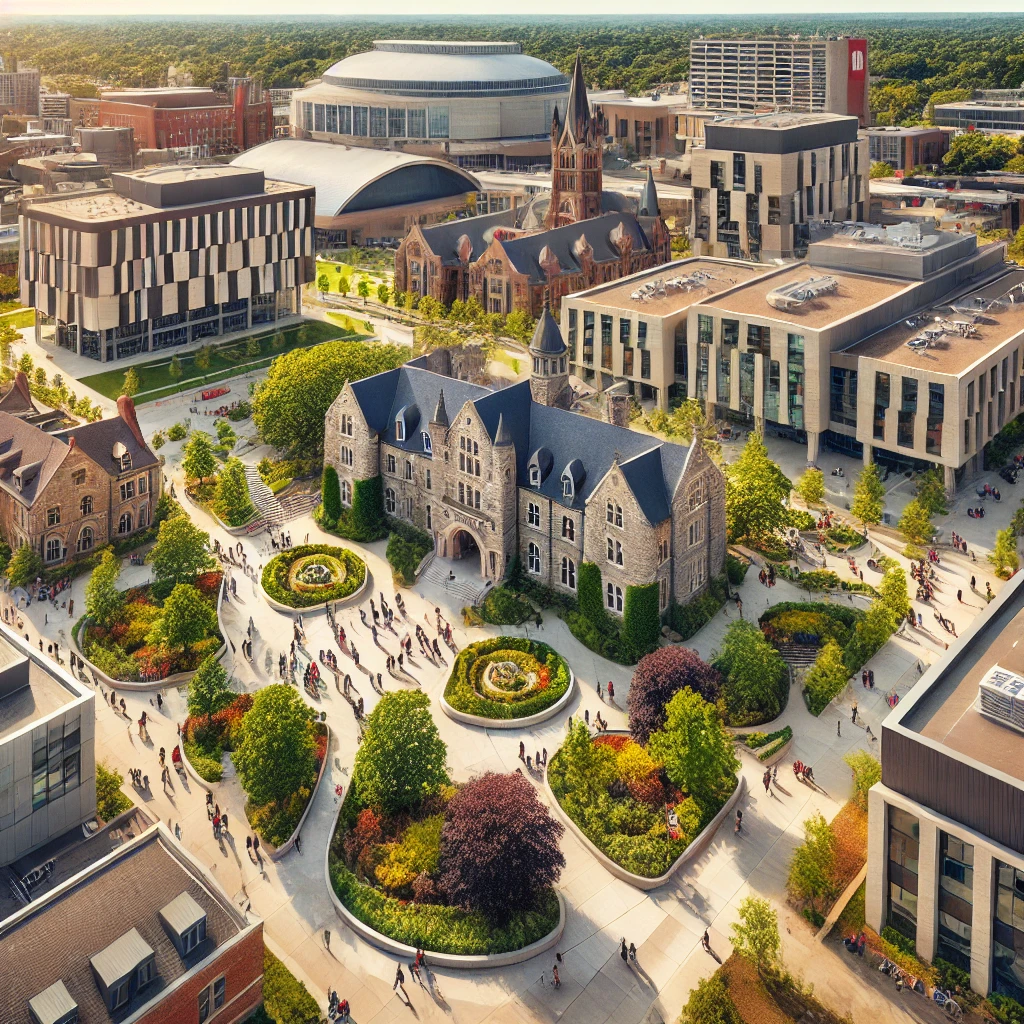McMaster University, located in Hamilton, Ontario, Canada, is a globally recognized research institution. Known for its innovative teaching and strong emphasis on interdisciplinary research, McMaster is one of Canada’s leading universities. It is especially renowned for its health sciences program, including its medical school, which pioneered the problem-based learning (PBL) curriculum.
Here are a few key highlights about McMaster:
- Founded: 1887, originally in Toronto before relocating to Hamilton in 1930.
- Motto: All Things Cohere in Christ (Ta panta en Christō synestēken).
- Faculties: Includes six faculties—Health Sciences, Engineering, Business (DeGroote School), Science, Humanities, and Social Sciences.
- Campus: Spanning 300 acres near the Royal Botanical Gardens, the campus offers state-of-the-art facilities and a vibrant academic environment.
- Global Ranking: Consistently ranks among the top 100 universities worldwide.
McMaster is also celebrated for its commitment to community engagement, sustainability initiatives, and fostering a collaborative environment for students and researchers. Let me know if you’d like specific details about programs, campus life, or notable achievements!
Overview of McMaster University
McMaster University, often referred to as Mac, is a public research university known for its pioneering educational strategies, emphasis on research-driven learning, and global impact. It has a reputation for producing well-rounded graduates and advancing scientific discoveries across disciplines.
Key Details:
- Location: Hamilton, Ontario, Canada
- Campus Size: 300 acres, located near the scenic Royal Botanical Gardens and Cootes Paradise, offering green spaces and natural trails.
- Enrollment: Over 37,000 students (undergraduate and graduate combined).
- Endowment: Over $1 billion CAD.
- University Colors: Maroon and Grey
- Mascot: Mac the Marauder
Faculties and Schools:
McMaster is organized into six faculties:
- DeGroote School of Business: Offers business degrees, including MBA programs.
- Faculty of Engineering: Known for its co-op programs, research in robotics, and innovation.
- Faculty of Health Sciences: Includes the prestigious Michael G. DeGroote School of Medicine and nursing programs. It’s a global leader in evidence-based medical education.
- Faculty of Humanities: Offers a wide range of programs in history, philosophy, literature, and arts.
- Faculty of Science: Recognized for research in physics, chemistry, biology, and interdisciplinary sciences.
- Faculty of Social Sciences: Known for programs in economics, political science, psychology, and social work.
Notable Features and Achievements:
- Research Excellence:
- McMaster is a member of the U15 Group of Canadian Research Universities.
- Annual research funding exceeds $400 million.
- Home to the McMaster Nuclear Reactor (MNR), a leading university-based reactor for nuclear research and medical isotope production.
- Innovative Education:
- The university introduced Problem-Based Learning (PBL) in its medical school, a method now adopted worldwide.
- Offers co-op and experiential learning opportunities, particularly in engineering, business, and health sciences.
- Rankings:
- Regularly ranks among the Top 100 universities globally (e.g., QS World Rankings and Times Higher Education).
- Health Sciences, Engineering, and Business programs are especially well-regarded.
- Sustainability and Campus Life:
- Recognized as a “Sustainable Campus” with green initiatives and eco-friendly infrastructure.
- Offers a diverse student body, with over 100 countries represented.
- Over 300 student clubs and organizations, promoting cultural, academic, and social engagement.
- Alumni and Notable Figures:
- Donna Strickland, Nobel Prize-winning physicist (2018).
- Martin Short, Emmy Award-winning actor and comedian.
- Numerous leaders in medicine, business, and public policy.
- Libraries and Facilities:
- Mills Memorial Library, Thode Library (Science & Engineering), and Innis Library (Business).
Research Centers and Institutes:
- McMaster Institute for Research on Aging (MIRA)
- Farncombe Family Digestive Health Research Institute
- McMaster Automotive Resource Centre (MARC)
- Centre for Advanced Nuclear Systems (CANS)
McMaster University: A Comprehensive Overview
Here’s an even deeper look at McMaster University’s history, academic environment, facilities, student life, and more.
History and Legacy
- Founding:
McMaster University was established in 1887 in Toronto, Ontario with funds bequeathed by Senator William McMaster, a prominent banker and the first president of the Canadian Imperial Bank of Commerce. The university initially served as a Baptist institution.
- Relocation to Hamilton:
In 1930, McMaster moved to its current location in Hamilton, primarily due to space constraints and the desire for a larger campus.
- Secular Transition:
In 1957, the university officially became a non-denominational institution while maintaining the name and historical legacy.
Campus and Facilities
Main Campus (Westdale Campus)
- The main 300-acre campus in the Westdale neighborhood of Hamilton is surrounded by the natural beauty of Cootes Paradise, a large wetland and wildlife sanctuary.
- Known for its mix of Gothic Revival architecture and modern buildings.
Satellite Campuses and Facilities
- McMaster Downtown Centre (Hamilton):
Hosts continuing education programs and community-oriented initiatives.
- Ron Joyce Centre (Burlington):
Home to the DeGroote School of Business MBA programs.
- McMaster Innovation Park:
A hub for research, commercialization, and innovation in partnership with industries.
- Health Sciences Centre:
Located on campus and houses the McMaster Children’s Hospital and research facilities.
Libraries and Special Collections
- Mills Memorial Library: Humanities and Social Sciences.
- H.G. Thode Library: Science and Engineering collections.
- Innis Library: Business resources.
- Archives and Research Collections:
Notable holdings include the Bertrand Russell Archives, one of the most extensive collections related to the British philosopher.
Innovative Learning Approaches
- Problem-Based Learning (PBL):
- Pioneered by McMaster’s Faculty of Health Sciences, this method involves collaborative, case-based learning to solve real-world problems.
- Widely adopted across medicine, engineering, and other faculties worldwide.
- Interdisciplinary Programs:
- Unique programs like Integrated Science (iSci) and Arts & Science encourage cross-disciplinary collaboration.
- Co-Op Education:
- Engineering, Business, and Computer Science students benefit from extensive co-op placements with industry partners, offering practical work experience.
Research Excellence
- McMaster is consistently ranked among Canada’s top research-intensive universities.
- Key Research Strengths:
- Health Sciences and Medicine
- Nuclear Research
- Materials Science and Engineering
- Automotive and Manufacturing Innovation
- Aging and Health Research
- Annual Research Budget: Over $400 million CAD.
Notable Research Institutes:
- McMaster Nuclear Reactor (MNR):
One of the most powerful university research reactors in the world, used for producing medical isotopes and conducting nuclear research.
- Michael G. DeGroote Institute for Infectious Disease Research (IIDR):
Focuses on tackling antibiotic resistance and infectious diseases.
- Canadian Centre for Electron Microscopy (CCEM):
Offers state-of-the-art imaging facilities for materials science research.
Student Life and Community Engagement
- Student Organizations:
- Over 300 clubs and societies cater to interests in academics, culture, arts, and sports.
- McMaster Students Union (MSU) represents undergraduate students and organizes events like Welcome Week and Frost Week.
- Athletics and Sports:
- Competes in U Sports under the name McMaster Marauders.
- Facilities include the David Braley Athletic Centre, Ron Joyce Stadium, and the Ivor Wynne Centre.
- Offers sports like football, basketball, soccer, volleyball, and more.
- Campus Events and Traditions:
- Welcome Week: An orientation week for new students with social events and activities.
- Light Up the Night: Holiday-themed festival on campus.
- Charity Events: Annual events like Mac Dance Marathon raise funds for health initiatives.
- Housing and Residences:
- Over 12 residence halls accommodating more than 3,600 students.
- Residences range from traditional dormitories to suite-style living.
Diversity and Inclusion
- International Students:
Represented by over 120 countries.
- Equity and Inclusion Office:
Promotes diversity, equity, and a respectful campus environment.
- Indigenous Studies:
Programs and support services for Indigenous students through the Indigenous Student Services Office and initiatives like the McMaster Indigenous Research Institute (MIRI).
Global Reputation and Rankings
- Times Higher Education (THE) World University Rankings 2024: Ranked 4th in Canada and 85th globally.
- QS World University Rankings 2024: Placed among the Top 150 universities worldwide.
- Shanghai Ranking (ARWU) 2023: Ranked in the Top 100 globally.
- Impact Rankings: Recognized for sustainability and contributions to the United Nations Sustainable Development Goals (SDGs).
Notable Alumni
- Academics and Scientists:
- Donna Strickland: Nobel Laureate in Physics (2018).
- Dr. John Bienenstock: Immunologist and pioneer in mucosal immunology.
- Business Leaders:
- Rob McEwen: Founder of Goldcorp Inc.
- Entertainment:
- Martin Short: Comedian and actor.
- Eugene Levy: Actor and writer.
- Public Service and Policy:
- Lincoln Alexander: First Black Member of Parliament in Canada.
Conclusion
McMaster University continues to stand out for its research, innovation, and commitment to student success. It fosters a collaborative learning environment that prepares students to tackle complex global challenges.
Let me know if you’d like more specific details or have any questions about a particular program or aspect of McMaster!
McMaster University: In-Depth Exploration
Here’s an even deeper dive into McMaster University, covering its academic reputation, student services, partnerships, international reach, and more.
Academic Excellence and Programs
Undergraduate Programs
McMaster offers a diverse range of undergraduate degrees across six faculties, each designed to provide a mix of theoretical knowledge and hands-on experience.
- Bachelor of Health Sciences (BHSc):
One of Canada’s most competitive undergraduate programs, focusing on interdisciplinary health sciences education and research.
- Integrated Science (iSci):
An interdisciplinary program combining various science disciplines, fostering critical thinking and research skills.
- Engineering Co-op Programs:
Offers disciplines like Mechanical, Civil, Software, Biomedical, and Electrical Engineering. The co-op option integrates classroom learning with real-world work experience, providing up to 24 months of paid placements.
- Arts & Science Program:
A rigorous interdisciplinary program that combines humanities, sciences, and social sciences, promoting a broad understanding of complex issues.
- DeGroote School of Business:
Offers BCom and Honours BCom programs with options for specializations in finance, marketing, and entrepreneurship.
Graduate and Professional Programs
McMaster provides over 150 graduate programs leading to master’s and doctoral degrees. Some notable graduate programs include:
- MBA (Master of Business Administration):
Offered by the DeGroote School of Business with options for full-time, co-op, and executive streams.
- MD (Doctor of Medicine):
McMaster’s Michael G. DeGroote School of Medicine is internationally acclaimed for its three-year accelerated MD program, based on Problem-Based Learning (PBL).
- Master of Public Health (MPH):
Focuses on health policy, epidemiology, and global health challenges.
- PhD Programs:
Available in a wide range of disciplines, including Biomedical Engineering, Neuroscience, and Environmental Sciences.
Online and Continuing Education
- McMaster Continuing Education:
Offers certificate and diploma programs in fields like business, health, data science, and technology. Flexible learning options cater to working professionals.
- Virtual and Blended Learning:
The university has expanded its online offerings, providing accessible education options for students worldwide.
International Reach and Partnerships
Global Collaborations
- McMaster maintains over 100 partnerships with universities and research institutions worldwide, facilitating student exchanges, joint research projects, and international conferences.
- Study Abroad Programs:
Opportunities for students to study in countries like the UK, France, Germany, Australia, and Japan.
International Student Support
- International Student Services (ISS):
Offers assistance with visas, housing, and integration into Canadian culture.
- English Language Development Programs:
Helps international students improve academic English skills through courses and workshops.
Innovation and Industry Partnerships
McMaster Innovation Park (MIP)
- A 37-acre research and innovation hub designed to foster collaboration between academia, industry, and government.
- Home to tech startups, research labs, and advanced manufacturing facilities.
- Focus areas include clean energy, life sciences, and advanced materials.
Industry Collaborations
- Partnerships with companies like IBM, Ford, and Siemens provide students with opportunities for internships, research projects, and job placements.
- McMaster Automotive Resource Centre (MARC): Focuses on automotive innovation, electric vehicles, and sustainable transportation.
Sustainability Initiatives
- Sustainable Development Goals (SDGs):
McMaster is recognized for its commitment to the UN’s SDGs, particularly in areas like health, clean energy, and climate action.
- Campus Initiatives:
- Zero-Waste Initiatives: Targeting a 90% waste diversion rate.
- Green Buildings: LEED-certified buildings, such as the David Braley Health Sciences Centre.
- Bike Share and Public Transit: Supports sustainable commuting options for students and staff.
Health and Wellness Services
Student Wellness Centre
- Offers services including:
- Mental Health Counseling
- Medical Services
- Wellness Education Programs
Recreation and Fitness
- David Braley Athletic Centre (DBAC):
Features a gym, pool, climbing wall, and fitness studios.
- Intramural Sports and Clubs:
Options for recreational sports, including soccer, basketball, and ultimate frisbee.
Diversity and Inclusion Initiatives
- Equity and Inclusion Office:
Promotes anti-racism, gender equity, and accessibility.
- Pride Community Centre:
Supports LGBTQ+ students with resources and events.
- Indigenous Student Services:
Provides support and cultural programs for Indigenous students.
Community Engagement and Outreach
- McMaster Community Engagement Strategy:
Encourages students and staff to work on projects benefiting the local Hamilton community.
- **Programs like MacChangers and The Forge support student-led innovation and social entrepreneurship.
Rankings and Accolades
- Times Higher Education (THE) Impact Rankings:
Top 40 globally for contributions to sustainability and societal impact.
- QS World University Rankings:
Among the Top 150 universities globally.
- Shanghai Academic Ranking of World Universities (ARWU):
Consistently in the Top 100 for medical and health sciences.
Future Developments
McMaster continues to expand with ambitious plans:
- New Health Sciences Building: Focused on cutting-edge research and training.
- Campus Expansion Projects: Enhancing student housing, research labs, and innovation hubs.
Conclusion
McMaster University stands out for its dedication to research excellence, innovative teaching, and community engagement. Its holistic approach to education equips students with the skills and experiences needed to make a meaningful impact in their fields and society.
Let me know if you’d like even more details on any specific aspect of McMaster University!


